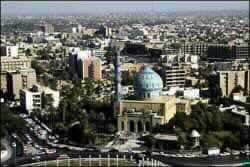- Author:
& News Agencies - Section:
WORLD HEADLINES
Iraq defies world to find any prohibited weapons as UN inspectors awaited

Iraq, defying the world to find any prohibited weapons, is holding out a welcome to UN arms chief Hans Blix who arrives tomorrow to launch a disarmament process Washington believes will fail.President Saddam Hussein announced that Baghad no longer possesses the weapons of mass destruction Washington and London insist he does.
"We will welcome and cooperate with" chief arms inspector Hans Blix and International Atomic Energy Agency (IAEA) director general Mohamed El Baradei when they arrive here Monday, Deputy Prime Minister Tareq Aziz told reporters.
The UN arms inspectors bear a "huge responsibility," and "the future of the Iraqi people" depends on them, an influential Iraqi newspaper said Sunday.
"We hope and pray that the teams of inspectors and their chiefs will act objectively as UN officials, since they bear a huge responsibility on which the fate and future of the Iraqi people, as well as the region's security and stability, depend," wrote Babel, which is run by Saddam's elder son, Uday.
Blix, leading the vanguard of inspectors, said in Paris en route to Baghdad via Cyprus that any violation of UN disarmament resolutions by Iraq would be serious.
He conceded that the previous UN inspections mission that collapsed four years ago had been compromised by being "too closely associated with intelligence and with Western states".
And Blix could give no guarantees that the new teams would not contain spies although he said the new inspection body UNMOVIC, set up in 1999, was more independent.
The Washington Post reported Sunday that the United States and the United Nations are divided over how aggressively inspectors should hunt for chemical, biological and nuclear weapons programmes in Iraq.
The US administration is insisting on the most intrusive inspections possible, and President George Bush has argued for "zero tolerance," with even minor infractions a potential cause for military action.
However Blix, UN Secretary General Kofi Annan and Security Council members Russia and France maintain that Iraq will be held accountable only for serious violations.
Bush warned again Saturday that the Iraqi "dictator" either had to give up his arms or the United States would lead a military coalition to disarm him.
Saddam wrote in a letter to Iraq's parliament that he had accepted the stringent terms of UN Resolution 1441 to avoid giving the United States any pretext to attack.
"Your enemy has again tried to push its plans through under the cover of the Security Council," his message read. "We hope that the method we have chosen will result in the truth coming out, which is that Iraq is free of weapons of mass destruction."
Blix said that under the resolution Iraq must submit to inspections or face "serious consequences".
"A denial of access, or delayed access, or an attempt to put something off-bounds -- this would be very serious," Blix said following talks in Paris with French Foreign Minister Dominique de Villepin.
The question of what constitutes a "material breach" of Iraq's commitments is crucial to the mission's future.
Blix has said it is up to the Security Council to make that decision, and his teams will limit themselves to factual reporting on the ground.
But there are signs that the United States is prepared to go it alone against Iraq if the Security Council's terms are not met and the council drags its feet in responding.
Bush was buoyed by opinion polls showing Americans would support a unilateral invasion of Iraq if the UN resolution was not obeyed.
"We're moving aggressively to protect our people and to oppose a great threat to the peace of the world," he said in a weekly radio address.
A poll released Saturday showed 63 percent of Americans believe war with Iraq is inevitable, and less than one-third think a peaceful settlement is possible.
But Russian Foreign Minister Igor Ivanov warned in Moscow that any use of force against Iraq would have to be first approved by the UN Security Council.
"We must take into account any and all scenarios, including use of force, but this decision can be made only by the Security Council," Ivanov told Rossiya television.
In his message to parliament, Saddam said he hoped his decision to accept the UN resolution would help other Security Council members "strive to lift the embargo and all the unjust sanctions as well as bring an end to all sorts of interference in Iraq's affairs."
He also called for the abolition of the "illegal" air exclusion zones enforced by the United States and Britain in northern and southern Iraq.
US and British warplanes killed seven Iraqis and wounded four others in air raids on "civilian installations" in the southern province of Najaf, a military spokesman said Saturday.
Meanwhile, the Los Angeles Times reported that a fleet of nondescript trucks crisscrossing Iraq is believed by Western intelligence sources to be carrying biological weapons.
The suspected mobile weapons labs were said to carry germ agents such as anthrax, botulinum toxin and aflatoxin that could kill hundreds of thousands.
PHOTO CAPTION
A general view of Baghdad


 Home
Home Discover Islam
Discover Islam Quran Recitations
Quran Recitations Lectures
Lectures
 Fatwa
Fatwa Articles
Articles Fiqh
Fiqh E-Books
E-Books Boys & Girls
Boys & Girls  Women
Women









